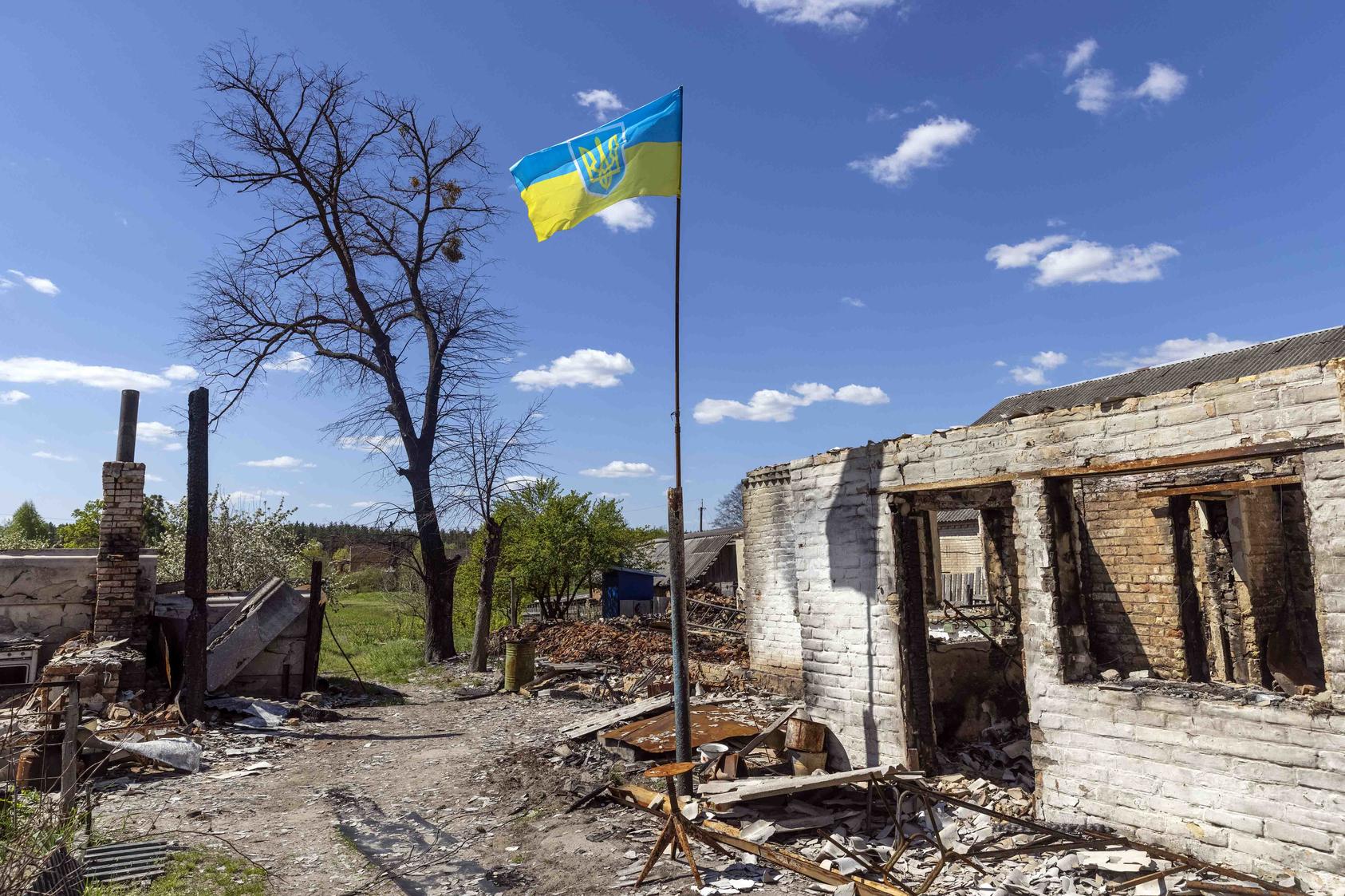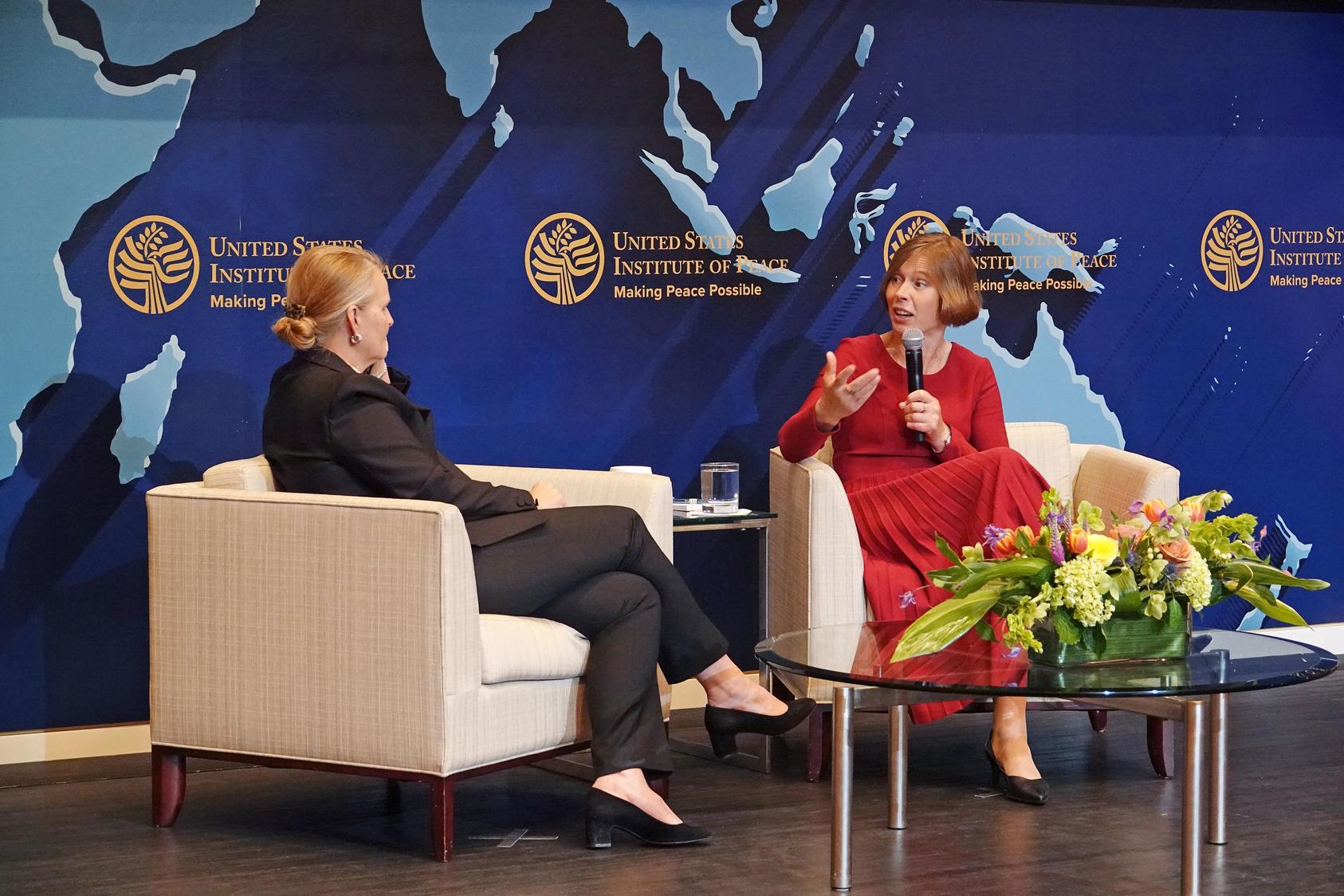Kersti Kaljulaid urges West to enhance support for Ukraine, maintain sanctions pressure on Russia.
Kersti Kaljulaid, a former president of Estonia, wants the West to enhance its support for Ukraine, end its dependence on Russian gas, and maintain sanctions on Russia even after Vladimir Putin’s war in Ukraine is over. Speaking at the U.S. Institute of Peace on May 10, Kaljulaid described the ongoing war in Ukraine as one that is between “the free world and the other world, a world of tyranny.” She warned: “If Ukraine loses, we all would have lost.”

Despite the high stakes, Kaljulaid said it is not evident that the pressure of U.S. and European sanctions on Russia will remain in place or that Europe is moving fast enough to end its dependence on Russian energy exports. As a consequence, she said, “I have been on a mission to force us to look into the mirror and accept that long-term economic suffering might be needed in order to make sure that the free world wins this war.”
Contending that the West did not respond in a meaningful way to Russia’s war in Georgia in 2008 or its annexation of Crimea in 2014, Kaljulaid is determined to be vocal about the risks of Western failure in the face of Russia’s latest aggression in Ukraine. If Russia’s invasion of Ukraine is seen by autocrat-led states as “a step worth taking,” others will follow, Kaljulaid said. “No autocrat will respect the will of the free and democratic world to defend itself if we lose this one.” She recommended that even after the war in Ukraine ends, economic pressure in the form of sanctions must remain on Russia for the sake of a “free and democratic world.”
Following her remarks, Kaljulaid participated in a discussion moderated by USIP President and CEO Lise Grande. Russia’s war in Ukraine “has created a fundamental shift in European, transatlantic and global security,” Grande said. She described Estonia — which is a member of both the European Union (EU) and NATO — as a “leader in fostering strong transatlantic cooperation and guaranteeing European security.”
‘This War Is About Freedom’
On February 24, Russia launched a full-scale military invasion of Ukraine that sought to capture major cities, including the Ukrainian capital, Kyiv, expand its hold over the occupied eastern regions of Luhansk and Donbas, and take control of Ukraine’s Black Sea coast. Russian forces have since become bogged down and suffered heavy losses in the face of a determined Ukrainian resistance and substantial Western military, economic and humanitarian assistance. Thousands of Ukrainian lives have also been lost and, according to the United Nations High Commissioner for Refugees (UNHCR), close to six million Ukrainians been forced to flee the country, more than half of that number to Poland.
Kaljulaid said Putin had “miscalculated” by invading Ukraine. The Russian president has never understood that the will of the people in democratic nations cannot be broken, even with military aggression, she said.

When Russia’s neighbors express an interest in being part of the free and democratic world, Kaljulaid said Putin attributes this sentiment to Western influence. “The man has never understood that people are drawn to such a way of governance, drawn strongly enough to defy all the risks on the way,” she said. “There is no such thing like [the] free world expanding its influence. The free world simply has so strong [a] pull that nations are ready to take high risks or fight for the right to belong.”
“The Orwellian world of killing people for exercising their right to decide their own future while not even believing people have the ability to figure out what their dreams are by democratic process, that is what Putin’s worldview truly is. That is what his fatal miscalculation is,” said Kaljulaid.
“Make no mistake of that, this war [in Ukraine] is about freedom,” she added.
The Transatlantic Response
The transatlantic alliance has come together in the face of Russia’s invasion of Ukraine. The Biden administration has ramped up sanctions on Russia, including on Putin’s inner circle, in an effort to end the war. Western support for Ukraine has come in the form of defense equipment and intelligence. Western countries have also taken in hundreds of thousands of Ukrainian refugees.
On the other hand, Putin has sought to exploit European dependence on Russian energy exports in his attempt to split the transatlantic alliance. In April, for example, Russia halted fuel exports to Poland and Bulgaria.
Since Russia’s invasion of Ukraine in February, some European countries have taken steps to wean themselves off Russian energy exports. The United Kingdom, for example, is looking to phase out all Russian oil and gas exports by the end of 2022; Germany has halted the Nord Stream 2 pipeline project that would bring Russian gas to Germany; the EU has proposed to ban all Russian oil from Europe; and Italian Prime Minister Mario Draghi, offering Italy’s support for such an embargo, has described the choice for the West as one between peace and air conditioning. Kaljulaid welcomed such developments, adding: “We need more of that resolve.” However, Hungary and Slovakia, two countries that are heavily reliant on Russian energy exports, have opposed the proposed EU embargo.
Kaljulaid said that if the war in Ukraine continues for much longer, “the sunken costs of turning away from Russian energy will be high enough to make sure that we stay the course” on ending a dependence on Russian energy. However, she noted, private sector LNG companies want guarantees that Europe will not turn back to Russian hydrocarbons, but these guarantees are taking far too long. Given the interconnectedness in the European market, she asked: “How can the Estonian government guarantee an LNG terminal which would serve not only the Estonian market but the wider surroundings if it doesn’t know what the others will do with their gas contracts with Russia?” She described this as a “trap” from which Europe is struggling to break out.
Ukraine’s EU Membership Goals
Ukrainian President Volodymyr Zelensky has urged the EU to offer his nation membership in the bloc. Such an invitation, he said, would be a “powerful response” to Russia’s invasion. If Ukraine does become a member, the EU would be committed to taking all necessary action to defend it from Russian aggression.
Before the war, Ukraine’s bid for membership in the EU and NATO had been stymied by concerns in Brussels over the slow pace of its democratic reforms and some European countries’ unwillingness to antagonize Russia. Kaljulaid said Ukraine could have done a better job of putting in place reforms that would have facilitated its entry into these institutions. “But the people of Ukraine made clear in 2014, on Maidan, where they think their country should be going,” she said, referring to the protests that culminated in the ouster of Russian-backed president Viktor Yanukovych.
Kaljulaid said the West must give Ukrainians the hope of one day joining the EU.
A Warning About Appeasement
Kaljulaid wonders if the West fully grasps what is at stake in Ukraine. “Will we fall back into our old ways of discussing appeasement, painting Putin out of a corner, finding excuses to continuing doing business and removing sanctions” on Russia, she asked. Every sign of appeasement, the former Estonian leader said, will be viewed in Moscow as Western weakness.
“It is my obligation to stand here to say to you, once cannons are quiet it gets tougher for the politicians of the free world. But we must explain to our electorates that the fight must continue, sanctions must stay in place. It is long-term, painful; it will demand a lot of strategic patience,” Kaljulaid said. “Dictatorships must learn by seeing we are able to be patient, accept economic pain and stick together for the free world even through considerable hardships, because if we fail the worst is to come.”
“All autocrats are watching how [the] Ukrainian people are buying us time. They will watch how we will use this time, too,” she said.
Grande alluded to comments from Russian leadership that they can withstand even greater hardship than the West, and that the West would eventually cave.
“We have to prove them wrong,” Kaljulaid replied.